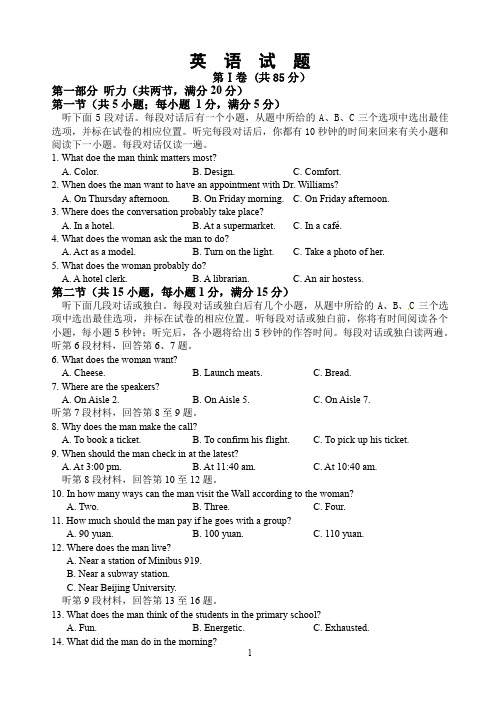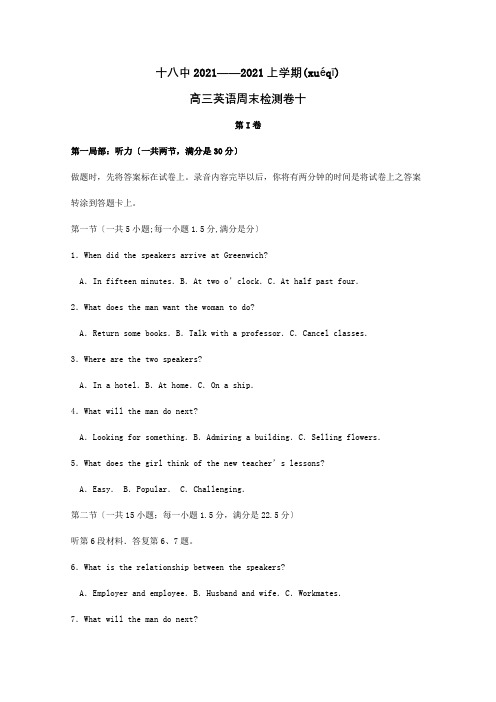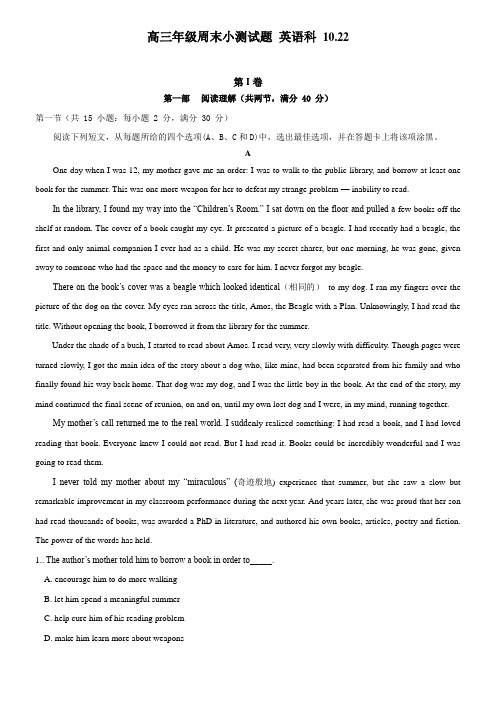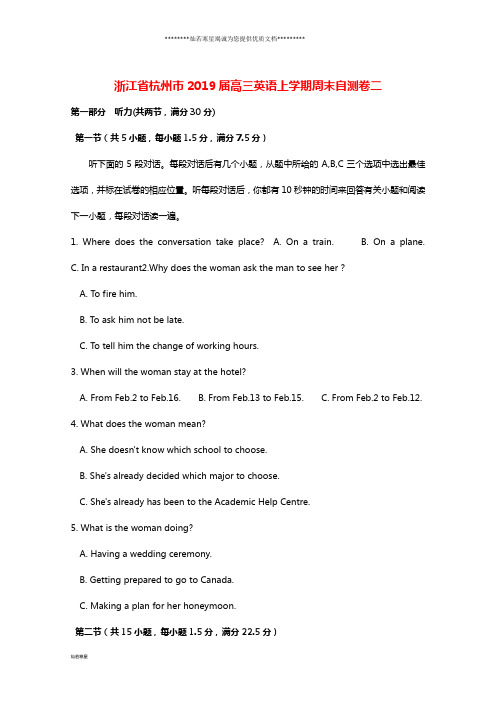高三英语周末测试
高三英语周末训练试题及答案

英语试题第Ⅰ卷(共85分)第一部分听力(共两节,满分20分)第一节(共5小题;每小题1分,满分5分)听下面5段对话。
每段对话后有一个小题,从题中所给的A、B、C三个选项中选出最佳选项,并标在试卷的相应位置。
听完每段对话后,你都有10秒钟的时间来回来有关小题和阅读下一小题。
每段对话仅读一遍。
1. What doe the man think matters most?A. Color.B. Design.C. Comfort.2. When does the man want to have an appointment with Dr. Williams?A. On Thursday afternoon.B. On Friday morning.C. On Friday afternoon.3. Where does the conversation probably take place?A. In a hotel.B. At a supermarket.C. In a café.4. What does the woman ask the man to do?A. Act as a model.B. Turn on the light.C. Take a photo of her.5. What does the woman probably do?A. A hotel clerk.B. A librarian.C. An air hostess.第二节(共15小题,每小题1分,满分15分)听下面几段对话或独白。
每段对话或独白后有几个小题,从题中所给的A、B、C三个选项中选出最佳选项,并标在试卷的相应位置。
听每段对话或独白前,你将有时间阅读各个小题,每小题5秒钟;听完后,各小题将给出5秒钟的作答时间。
每段对话或独白读两遍。
听第6段材料,回答第6、7题。
6. What does the woman want?A. Cheese.B. Launch meats.C. Bread.7. Where are the speakers?A. On Aisle 2.B. On Aisle 5.C. On Aisle 7.听第7段材料,回答第8至9题。
高三英语上学期周末检测卷十七试题(共36页)

十八中2021——2021上学期(xuéqī)高三英语周末检测卷十七第一卷第一局部听力〔一共两节,满分是30分〕第一节〔一共5小题;每一小题分,满分是分〕听下面5段对话。
每段对话后有一个小题,从题中所给的A、B、C三个选项里面选出最正确选项,并标在试卷的相应位置。
听完每段对话后,你都有10秒钟的时间是来答复有关小题和阅读下一小题。
每段对话仅读一遍。
1.How much was the TV set?A.$ 60.B. $120.C. $30.2.What was Tom doing?A.He was chatting with the postman.B.He was hiding around the corner.C.He was helping the postman with his work.3.What does the man want to do?A.Buy a fan.e electricity.C.Cool himself down.4.Why did the boss scold Joseph?A.He was two minutes late for work.B.The man speaker quarrelled with the boss.C.He criticized the man speaker too seriously.5.Who is Fiona?A.The woman speaker.B.Thompson’s sister.C.Daisy’s sister第二节〔一共(yīgòng)15小题;每一小题分,满分是分〕听下面5段对话或者独白。
每段对话或者独白后有几个小题,从题中所给的A、B、C三个选项里面选出最正确选项,并标在试卷的相应位置。
听每段对话或者独白前,你将有时间是阅读各个小题,每一小题5秒钟;听完后,各小题将给出5秒钟的答题时间是。
高三英语上学期周末检测卷十试题(共19页)

十八中2021——2021上学期(xuéqī)高三英语周末检测卷十第I卷第一局部:听力〔一共两节,满分是30分〕做题时,先将答案标在试卷上。
录音内容完毕以后,你将有两分钟的时间是将试卷上之答案转涂到答题卡上。
第一节〔一共5小题;每一小题1.5分,满分是分〕1.When did the speakers arrive at Greenwich?A.In fifteen minutes.B.At two o’clock.C.At half past four.2.What does the man want the woman to do?A.Return some books.B.Talk with a professor.C.Cancel classes.3.Where are the two speakers?A.In a hotel.B.At home.C.On a ship.4.What will the man do next?A.Looking for something.B.Admiring a building.C.Selling flowers.5.What doe s the girl think of the new teacher’s lessons?A.Easy. B.Popular. C.Challenging.第二节〔一共15小题;每一小题1.5分,满分是22.5分〕听第6段材料.答复第6、7题。
6.What is the relationship between the speakers?A.Employer and employee.B.Husband and wife.C.Workmates.7.What will the man do next?A.Clear dirty dishes.B.Change tablecloths.C.Fold the paper.听第7段材料(cáiliào),答复第8、9题。
高三英语周末小测试题

高三年级周末小测试题英语科10.22第I卷第一部阅读理解(共两节,满分 40 分)第一节(共 15 小题:每小题 2 分,满分 30 分)阅读下列短文,从每题所给的四个选项(A、B、C和D)中,选出最佳选项,并在答题卡上将该项涂黑。
AOne day when I was 12, my mother gave me an order: I was to walk to the public library, and borrow at least one book for the summer. This was one more weapon for her to defeat my strange problem — inability to read.In the library, I found my way into the “Children’s Room.” I sat down on the floor and pulled a few books off the shelf at random. The cover of a book caught my eye. It presented a picture of a beagle. I had recently had a beagle, the first and only animal companion I ever had as a child. He was my secret sharer, but one morning, he was gone, given away to someone who had the space and the money to care for him. I never forgot my beagle.There on the book’s cover was a beagle which looked identical(相同的)to my dog. I ran my fingers over the picture of the dog on the cover. My eyes ran across the title, Amos, the Beagle with a Plan. Unknowingly, I had read the title. Without opening the book, I borrowed it from the library for the summer.Under the shade of a bush, I started to read about Amos. I read very, very slowly with difficulty. Though pages were turned slowly, I got the main idea of the story about a dog who, like mine, had been separated from his family and who finally found his way back home. That dog was my dog, and I was the little boy in the book. At the end of the story, my mind continued the final scene of reunion, on and on, until my own lost dog and I were, in my mind, running together.My mother’s call returned me to the real world. I suddenly realized something: I had read a book, and I had loved reading that book. Everyone knew I could not read. But I had read it. Books could be incredibly wonderful and I was going to read them.I never told my mother about my “miraculous” (奇迹般地) experience that summer, but she saw a slow but remarkable improvement in my classroom performance during the next year. And years later, she was proud that her son had read thousands of books, was awarded a PhD in literature, and authored his own books, articles, poetry and fiction. The power of the words has held.1.. The author’s mother told him to borrow a boo k in order to_____.A. encourage him to do more walkingB. let him spend a meaningful summerC. help cure him of his reading problemD. make him learn more about weapons2. The book caught the author’s eye because_____.A. it contained pretty pictures of animalsB. it reminded him of his own dogC. he found its title easy to understandD. he liked children’s stories very much3. Why could the author manage to read the book through?A. He was forced by his mother to read it.B. He identified with the story in the book.C. The book told the story of his pet dog.D. The happy ending of the story attracted him.4. What can be inferred from the last paragraph?A. The author has become a successful writer.B. The author’s mother read the same book.C. The autho r’s mother rewarded him with books.D. The author has had happy summers ever since.5. Which one could be the best title of the passage?A. The Charm of a BookB. Mum’s Strict OrderC. Reunion with My BeagleD. My Passion for ReadingBVisitor code● Arrive with nothing that can harm New ZealandIf you are arriving from overseas, bring no food, animal or plant material into the country. If in doubt declare it to Customs.● Protect plants and animalsNever allow dogs or other pets to run freely in areas of nesting birds, other wildlife, or where signposted.● Get rid of rubbishAlways get rid of your rubbish properly and recycle waste (e.g. glass, paper) where possible.● Be considerate with other wasteIf using a portable toilet always throw away your toilet waste at a proper waste station. In the back country, bury your toilet waste in a shallow hole away from waterways.● Keep New Zealand's water cleanBecause soaps and other wastes can harm waterways, be careful your washing water doesn't pollute the sea, lakes and rivers.● Take care with fireAlways observe district fire bans. Be careful if you smoke or have an outdoor fire or barbecue—make sure ashes are cold before leaving.● Camp or picnic carefullyWhen camping or picnicking, use facilities provided.● Keep to the trackKeep to the track, where one exists, so you lessen the chance of damaging fragile plants.● Be considerateWhen driving, minimize noise and observe no smoking signs.6.According to the Code, visitors should act _______ .A. with care and respectB. with relief and pleasureC. with caution and calmnessD. with attention and observation7.What are you encouraged to do when travelling in New Zealand?A. Take your own camping facilities.B. Bury glass far away from rivers.C. Follow the track for the sake of plants.D. Observe signs to approach nesting birds.CScience has a lot of uses. It can uncover laws of nature, cure diseases, make bombs, and help bridges to stand up. Indeed science is so good at what it does that there’s always a temptation(诱惑) to drag it into problems where it may not be helpful. David Brooks, author of The Social Animal: The Hidden Sources of Love, Character, and Achievement, appears to be the latest in a long line of writers who have failed to resist the temptation.Brooks gained fame for several books. His latest book The Social Animal, however, is more ambitious and serious than his earlier books. It is an attempt to deal with a set of weighty topics. The book focuses on big questions: What has science revealed about human nature? What are the sources of character? And why are some people happy and successful while others aren’t?To answer these questions, Brooks surveys a wide range of disciplines(学科). Considering this, you might expect the book to be a dry recitation of facts. But Brooks has structured his book in an unorthodox(非常规的), and perhaps unfortunate, way. Instead of introducing scientific theories, he tells a story, within which he tries to make his points, perhaps in order to keep the reader’s attention. So as Harold and Erica, the hero and heroine in his story, live through childhood, we hear about the science of child development and as they begin to date we hear about the theory of sexual attraction. Brooks carries this through to the death of one of his characters.On the whole, Brooks’s story is acceptable if uninspired. As one would expect, his writing is mostly clear an d, to be fair, some chapters stand out above the rest. I enjoyed, for instance, the chapter in which Harold discovers how to think on his own. While Harold and Erica are certainly not strong or memorable characters, the more serious problems with The Socia l Animal lie elsewhere. These problems partly involve Brooks’s attempt to translate his tale into science.8.The author mentions the functions of science at the beginning of the passage to__________.A. illustrate where science can be appliedB. demonstrate the value of Brooks’s new bookC. remind the reader of the importance of scienceD. explain why many writers use science in their works9.According to the author, which of the following could be a strength of the book?A. Its strong basis.B. Its convincing points.C. Its clear writing.D. Its memorable characters.10.What is the author’s general attitude towards the book?A. Contradictory.B. Supportive. C . Cautious. D. Critical.11.What is the author likely to write about after the last paragraph?A. Problems with the book.B. Brooks’s life experience.C. Death of the characters.D. Brooks’s translation skills.DI left university with a good degree in English Literature, but no sense of what I wanted to do. Over the next six years, I was treading water just trying to earn an income. I tried journalism, but I didn’t think I was any good, then finance, which I hated. Finally, I get a job as a rights assistant at a famous publisher. I loved working with books, although the job that I did was dull.I had enough savings to take a year off work, and I decided to try to satisfy a deep down wish to write a novel. Attending a Novel Writing MA course gave me the structure I needed to write my first 55,000 words.It takes confidence to make a new start-there’s a dark period in between where you’re neither one thing nor the other. You’re out for dinner and people ask what you do, and you’re too ashamed to say, “Well, I’m writing a novel, but I’m not quite sure if I’m going to get there.”My confidence dived. Believing my novel could not be published, I put it aside.Then I met an agent who said I should send my novel out to agents. So, I did and, to my surprise, got some wonderful feedback. I felt a little hope that I might actually become a published writer and, after signing with an agent, I finished the second half of the novel.The next problem was finding a publisher. After two and a half years of no income, just waiting and wondering, a publisher offered me a book deal-that publisher turned out to be the one I once worked for.It feels like an unbelievable stroke of luck—of fate, really. When you set out to do something different, there's no end in sight, so to find myself in a position where I now have my own name on a contract of the publisher—to be a published writer—is unbelievably rewarding.12. What does the underlined part in Paragraph 1 mean?A.I was waiting for good fortune.B.I was trying to find an admirable job.C.I was being aimless about a suitable job.D.I was doing several jobs for more pay at a time.13. The author decided to write a novel________.A.to finish the writing courseB.to realize her own dreamC.to satisfy readers’ wishD.to earn more money14. How did the writer feel halfway with the novel?A.Disturbed. B.Ashamed. C.Confident. D.Uncertain.15. What does the author mainly want to tell readers in the last paragraph?A.It pays to stick to one’s goal.B.Hard work can lead to success.C.She feels like being unexpectedly lucky.D.There is no end in sight when starting to do something.第二节(共5小题;每小题2分,满分10分)根据短文内容,从短文后的选项中选出能填入空白处的最佳选项。
高三英语下学期周日测试试题(5.)高三全册英语试题

位敦市安定阳光实验学校中学高三下学期周日考试(5.22)英语试题本试卷分第I 卷(选择题)和第II 卷(非选择题)两。
共150分。
时间120分钟。
第I 卷(共100分)第一节听下面5段对话。
每段对话后有一个小题,从题中所给的A、B、C三个选项中选出最佳选项,并标在试卷的相位置。
听完每段对话后,你都有10秒钟的时间来回答有关小题和阅读下一小题。
每段对话仅读一遍。
1. Where does the conversation probably take place?A. In an office.B. In a theatre.C. In a restaurant.2. How old is the man now?A. About 20.B. Nearly 40.C. Over 60.3. What is the man going to do?A. Go to the information counter.B. Take a train to leave New York.C. Check the price of the ticket.4. What do we learn about the man?A. He quitted his job.B. He has got two job offers.C. He is doing a part-time job.5. What does Mr. Anderson do?A. He is a teacher.B. He is a librarian.C. He is a repairman.第二节听下面5段对话或独白。
每段对话或独白后有2至4个小题,从题中所给的A、B、C三个选项中选出最佳选项,并标在试卷的相位置。
听每段对话或独白前,你将有5秒钟的时间阅读各个小题;听完后,各小题将给出5秒钟的作答时间。
每段对话或独白读两遍。
听下面一段对话,回答第6和第7题。
高三英语上学期周末自测卷二

浙江省杭州市2019届高三英语上学期周末自测卷二第一部分听力(共两节,满分30分)第一节(共5小题,每小题1.5分,满分7.5分)听下面的5段对话。
每段对话后有几个小题,从题中所给的A,B,C三个选项中选出最佳选项,并标在试卷的相应位置。
听每段对话后,你都有10秒钟的时间来回答有关小题和阅读下一小题,每段对话读一遍。
1. Where does the conversation take place? A. On a train. B. On a plane.C. In a restaurant2.Why does the woman ask the man to see her?A. T o fire him.B. To ask him not be late.C. T o tell him the change of working hours.3. When will the woman stay at the hotel?A. From Feb.2 to Feb.16.B. From Feb.13 to Feb.15.C. From Feb.2 to Feb.12.4. What does the woman mean?A. She doesn't know which school to choose.B. She's already decided which major to choose.C. She's already has been to the Academic Help Centre.5. What is the woman doing?A. Having a wedding ceremony.B. Getting prepared to go to Canada.C. Making a plan for her honeymoon.第二节(共15小题,每小题1.5分,满分22.5分)听下面的5段对话或独白。
高三英语上学期周末检测试题

领兑市安插阳光实验学校达标校高三周末检测卷英语(一)第 I 卷第一:听力(共两节,满分30分)第一听力(共两节,满分30分)第一节(共5小题;每小题1.5分,满分7.5分)听下面5段对话。
每段对话后有一个小题,从题中所给的A、B、C三个选项中选出最佳选项,并标在试卷的相位置。
听完每段对话后,你都有10秒钟的时间来回答有关小题和阅读下一小题。
每段对话仅读一遍。
1. What does the man probably do?A. A shop assistant.B. A policeman.C. A postman.2. How old is the man's daughter?A. Six months old.B. One year old.C. Two years old.3. When did the woman plan to go to Spain?A. In spring.B. In summer.C. In autumn.4. Where will the speakers go first?A. A restaurant.B. A cinema.C. A hospital.5. What does the man think of the lecture?A. It was interesting.B. It was far beyond his understanding.C. It was long but easy to understand.第二节 (共15小题;每小题1.5分,满分22.5分)听下面5段对话或独白。
每段对话或独白后有几个小题,从题中所给的A、B、C三个选项中选出最佳选项,并标在试卷的相位置。
听每段对话或独白前,你将有时间阅读各个小题,每小题5秒钟;听完后,各小题将给出5秒钟的作答时间。
每段对话或独白读两遍。
听第6段材料,回答第6、7题。
6. What does the man usually do at home?A. Do the washing-up.B. Wash clothes.C. Clean the car.7. What does the man promise to do at last?A. Do all the housework from next weekend.B. Clean the kitchen after cooking.C. Prepare meals every day.听第7段材料,回答第8、9题。
高三英语上学期周末自测卷四试题(共24页)

2021届高三英语上学期周末(zhōumò)自测卷四第一局部听力〔一共两节,满分是30分〕第一节〔一共5小题;每一小题1.5分,满分是7.5分〕听下面5段对话。
每段对话后有一个小题,从题中所给的A、B、C三个选项里面选出最正确选项,并标在试卷的相应位置。
听完每段对话后,你都有10秒钟的时间是来答复有关小题和阅读下一小题。
每段对话仅读一遍。
1. Where is the conversation taking place?A. In a restaurant.B. In a hotel.C. In a tea house.2. Who’s the man probably?A. A salesman.B. A customer.C. A shopkeeper.3. What does the woman mean?A. She doesn’t know the road.B. She is new here.C. She will guide the road.4. What might the weather report say?A. I t’s cold today.B. It’s warm today.C. It’s snowy today.5. Why does Emma come here?A. To attend Professor Austin’s lecture.B. To ask for help.C. To hand in her paper.第二节〔一共15小题(xiǎo tí);每一小题1.5分,满分是22.5分〕听下面5段对话或者独白。
每段对话或者独白后有几个小题,从题中所给的A、B、C三个选项里面选出最正确选项,并标在试卷的相应位置。
听每段对话或者独白前,你将有时间是阅读各个小题,每一小题5秒钟;听完后,各小题将给出5秒钟的答题时间是。
每段对话或者独白读两遍。
- 1、下载文档前请自行甄别文档内容的完整性,平台不提供额外的编辑、内容补充、找答案等附加服务。
- 2、"仅部分预览"的文档,不可在线预览部分如存在完整性等问题,可反馈申请退款(可完整预览的文档不适用该条件!)。
- 3、如文档侵犯您的权益,请联系客服反馈,我们会尽快为您处理(人工客服工作时间:9:00-18:30)。
高三周末测试英语试卷姓名_______ 班级_________考号______一、完形填空(共20小题,每题2分,共40分)Everything about my future was ambiguously assumed. I would get into debt by going to college, and then I would be __41__ to get a job to pay off that debt, while still getting into more and more debt by __42__ a house and a car. It seemed like a never-ending __43__ that had no place for the possibility of a dream.I want more—but not __44__ in the material sense of personal __45__ and success. I want more out of life. I want a passion as well as a dream that wouldn't let me sleep out of pure excitement. I want to spring out of bed in the morning, rain or __46__,and have that enthusiasm for life that seemed so intrinsic(固有的) in the early childhood.We all have a dream. It might be clearly __47__ or just a vague idea, but most of us are so __48__ in the mud of insecurity and self-doubt that we just __49__ it as unrealistic or too difficult to pursue. We become so comfortable with the life that has been __50__ for us by our parents, teachers, traditions, and social standards that we feel that it's stupid and unsafe to __51__ losing it for the small hope of achieving something that is more satisfying.Taking a risk is __52__ a risk. We can, and will, fail, __53__ many, many, many times. But that is what makes it exciting for me. That __54__ can be viewed negatively, or it can __55__ us.Failing is what makes us grow, and it makes us stronger. The fear of __56__,though, is what makes us sad. So __57__ I couldn't see the future as clearly as before, I took the plunge(投入) in__58__ that in the depths of fear and failure I would come out feeling more __59__ than ever before.If you feel lost, just take a deep breath and realize that being lost can be a turning point of finding out __60__ you truly are, and what you truly want to do.1.A. pleased B. encouraged C. disappointed D. forced2.A. selling B. purchasing C. constructing D. repairing3.A. dream B. story C. cycle D. dilemma4.A. necessarily B. possibly C. desperately D. nearly5.A. expense B. wealth C. addiction D. appetite6.A. cloud B. shower C. thunder D. shine7.A. described B. abandoned C. decided D. conducted8.A. engaged B. lacking C. stuck D. absorbed9.A. display B. dismiss C. deliver D. delay10.A. planned out B. put out C. made out D. carried out11.A. avoid B. imagine C. suggest D. risk12.A. even B. still C. rather D. only13.A. fortunately B. finally C. possibly D. hopefully14.A. uncertainty B. contradiction C. declaration D. prediction15.A. defeat B. confuse C. inspire D. discourage16.A. danger B. threat C. growth D. failure17.A. as though B. even though C. as long as D. as far as18.A. hopes B. cases C. ways D. terms19.A. sympathetic B. alive C. confused D. nervous20.A. as B. whether C. how D. who二、七选五(10分)根据短文内容,从短文后的选项中选出能填入空白处的最佳选项。
选项中有两项为多余选项。
Early to bed and early to rise makes a man healthy, wealthy and wise. 21______ Sleeping at 4 am and waking up at noon was a part of me. But after reading a subject on waking up early, I‘ve found that people waking up earlier are more productive and live happier.22____ I used to be a night owl, but now become the most productive person I've ever been. Would you like to become a morning person yourself ? Here are my tips.23______ If you always wake up at 10 to 11 am., it isn’t too realistic to expect that you will immediately wake up at 5 am the next day. But you can try 9:45 first and, slowly build it up to your desired time. The gradual method might work much better for sleeping patterns are difficult to change. That goes for eating or exercise habits as well. Just make a change from advancing your waking time with 15 minutes each day. 24_______.Then sleep earlier. You can’t just wake up earl y and not sleep early. Staying up late and getting up early will eventually break you down. So if you’re setting your alarm 15 minutes earlier than usual, make sure to sleep 15 minutes sooner as well.25______To wake up early, you need to have a strong motivation first. Once there's a forceful reason to do something the next morning, you will jump out of bed however sleepy you might be. For example, an extremely important and urgent task will wake you up early.Maybe, almost all attempts to wake up early will fail, but please don’t give up. So keep trying, and you’ll be a morning person.A、Have a compulsory reason.B、I’ d never been a morning person.C、Be possessed of strong determination.D、In this way, your goal will be reached in time.E、So I’ve started experimenting and received good results.F、In order to make a change, you need to make arrangements beforehand.G、The best method for changing your waking-up time is to do it gradually.三、语法填空(共10小题:每小题2分,满分20分)阅读下面材料,在空白处填入适当的内容(1个单词)或括号内单词的正确形式。
